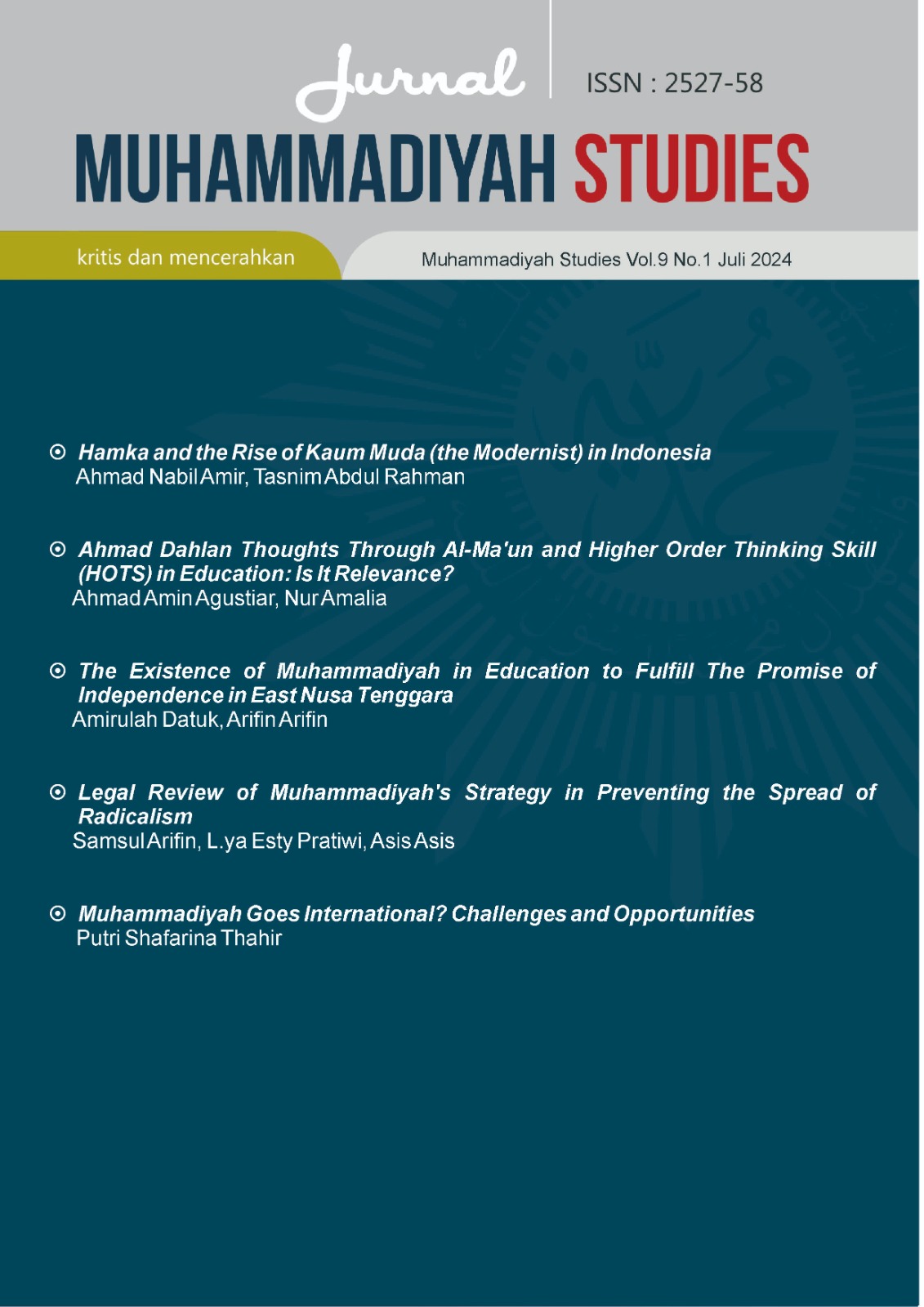Ahmad Dahlan Thoughts Through Al-Ma'un and Higher Order Thinking Skill (HOTS) in Education: Is It Relevance?
DOI:
https://doi.org/10.22219/jms.v9i1.12864Keywords:
Education; HOTS; Al-Ma'un; Ahmad DahlanAbstract
This research seeks to determine the significance of Higher-Order Thinking Skills (HOTS) learning in the Al-Ma'un philosophy, as KH Ahmad Dahlan taught. The method employed is a literature review, with data collected from literature relevant to the theme of KH Ahmad Dahlan and Higher-Order Thinking Skills (HOTS) learning. The data is then analyzed thematically and processed using an inductive method. According to the findings, KH Ahmad Dahlan taught Al-Ma'un to his students, which is similar to Higher-Order Thinking Skills or HOTS nowadays.
Downloads
References
Aditya, Zaka Firma, and Sholahuddin Al-Fatih. “Indonesian Constitutional Rights: Expressing and Purposing Opinions on the Internet.” International Journal of Human Rights 25, no. 9 (2021): 1395–1419. https://doi.org/10.1080/13642987.2020.1826450.
Agustiar, Ahmad Amin. “Relevansi Pembelajaran Higher Order Thinking Skill (HOTS) Dalam Peristiwa Geger Al-Ma’un Kh Ahmad Dahlan.” Surakarta, 2020. chrome-extension://efaidnbmnnnibpcajpcglclefindmkaj/https://eprints.ums.ac.id/85968/11/NASKAH PUBLIKASI.pdf.
Al-Fatih, Sholahuddin. Perkembangan Metode Penelitian Hukum Di Indonesia - Sholahuddin Al-Fatih - Google Buku. 1st ed. Vol. 1. Malang: UMM Press, 2023. https://books.google.co.id/books/about/Perkembangan_Metode_Penelitian_Hukum_di.html?id=EObiEAAAQBAJ&redir_esc=y.
Ali, Mohammad. “Paradigma Pendidikan Berkemajuan: Teori Dan Praksis Pendidikan Progresif Religius KH Ahmad Dahlan.” Suara Muhammadiyah. Yogyakarta, 2017. https://web.suaramuhammadiyah.id/2018/07/15/paradigma-pendidikan-berkemajuan-kiai-dahlan/.
Astuti, S. B. Waluya, and M. Asikin. “Strategi Pembelajaran Dalam Menghadapi Tantangan Era Revolusi Industri 4.0.” In Seminar Nasional Pascasarjana 2019, 469–73. Semarang: UNNES, 2019. https://proceeding.unnes.ac.id/index.php/snpasca/article/view/327.
Bayu, Haritza, Harya Putra, and Syamsul Arifin. “Neo Al-Ma’un Theology and Social Improvement of Society.” Paedagogie: Jurnal Pendidikan Dan Studi Islam 5, no. 02 (July 31, 2024): 161–71. https://doi.org/10.52593/PDG.05.2.04.
Devianta, D. “Saat Peran Manusia Digantikan ‘Robot’ Di Masa Depan.” Liputan 6, 2018. https://www.liputan6.com/regional/read/3645888/saat-peran-manusia-digantikan-robot-di-masa-depan.
Dinni, Husna Nur. “HOTS (High Order Thinking Skills) Dan Kaitannya Dengan Kemampuan Literasi Matematika.” PRISMA, Prosiding Seminar Nasional Matematika 1 (2018): 170–76. https://journal.unnes.ac.id/sju/prisma/article/view/19597.
Djafar, Hilman, Rasid Yunus, Sarson W DJ Pomalato, and Ruslan Rasid. “Qualitative and Quantitative Paradigm Constellation In Educational Research Methodology.” International Journal of Educational Research & Social Sciences 2, no. 2 (2021): 339–45. https://doi.org/10.51601/ijersc.v2i2.70.
Fauzi, Ahmad, and Ika Wahyu Pradipta. “Research Methods and Data Analysis Techniques in Education Articles Published by Indonesian Biology Educational Journals.” JPBI (Jurnal Pendidikan Biologi Indonesia) 4, no. 2 (2018): 123–34. https://doi.org/10.22219/jpbi.v4i2.5889.
Haqqi, Halifa, and Hasna Wijayanti. Revolusi Industri 4.0 Di Tengah Society 5.0. Yogyakarta: Quadrant, 2019.
Hermann, Mario, Tobias Pentek, and Boris Otto. “Design Principles for Industrie 4.0 Scenarios.” Proceedings of the Annual Hawaii International Conference on System Sciences 2016-March (March 7, 2016): 3928–37. https://doi.org/10.1109/HICSS.2016.488.
Isdiyanto, Ilham Yuli, Fauzan Muhammadi, and Umair Fahmiddin. “Tracing the Roots of Muhammadiyah Thought on the Concepts of Dār Al-Ahdi Wa Al-Syahadah.” Legality: Jurnal Ilmiah Hukum 30, no. 1 (April 27, 2022): 147–65. https://doi.org/10.22219/ljih.v30i1.20661.
Majid, Nuur Wachid Abdul. “Pendidikan Berkemajuan: Konsep Pemikiran KH Ahmad Dahlan Dalam Menghadapi Era Multidigital.” Muhammadiyah, 2018. http://arsip.muhammadiyah.or.id/id/artikel-pendidikan-berkemajuan-konsep-pemikiran-kh-ahmad-dahlan-dalam-menghadapi-era-multidigital-detail-984.html.
Masran, Md. Nasir, and Asna Zainatulnufus Esha. “Application of Higher Order Thinking Skills (HOTS) in Teaching and Learning Process in Islamic Education.” Advanced Science Letters 24, no. 7 (May 2, 2018): 5326–29. https://doi.org/10.1166/ASL.2018.11727.
Netriwati. “Penerapan Taksonomi Bloom Revisi Untuk Meningkatkan Kemampuan Pemahaman Konsep Matematis.” Desimal: Jurnal Matematika 1, no. 3 (September 30, 2018): 347–52. https://doi.org/10.24042/DJM.V1I3.3238.
Rosidi, Ahmad. “Pendidikan Dan Kebudayaan Ki Hajar Dewantara Dalam Perspektif Pendidikan Islam.” Institutional Repository UIN Sunan Kalijaga Yogyakarta, 2016. https://digilib.uin-suka.ac.id/id/eprint/20314/.
Saefudin, Saefudin. “Transformasi Doktrin Al-Ma’un Terhadap Penguatan Gerakan Ekonomi Muhammadiyah.” Jurnal Ilmiah Ekonomi Islam 8, no. 2 (July 19, 2022): 2120–34. https://doi.org/10.29040/JIEI.V8I2.5354.
Saputra, Hatta. Pengembangan Mutu Pendidikan Menuju Era Global: Penguatan Mutu Pembelajaran Dengan Penerapan HOTS (High Order Thinking Skills). 1st ed. Bandung: Smile`s Publishing, 2018. http://library.usd.ac.id/web/index.php?pilih=search&p=1&q=0000136800&go=Detail.
Vui, Tran. “Enhancing Classroom Communication to Develop Students’ Mathematical Thinking,” 2006. chrome-extension://efaidnbmnnnibpcajpcglclefindmkaj/https://www.criced.tsukuba.ac.jp/math/apec/apec2008/papers/PDF/21.Tran_Vui_Vietnam.pdf.
Downloads
Published
How to Cite
Issue
Section
License
Copyright (c) 1970 Ahmad Amin Agustiar

This work is licensed under a Creative Commons Attribution 4.0 International License.
Copyright Notice
Authors who publish with Jurnal Muhammadiyah Studies agree to the following terms:
- For all articles published in the Jurnal Muhammadiyah Studies, copyright is retained by the authors. Authors give permission to the publisher to announce the work with conditions. When the manuscript is accepted for publication, the authors agree to the automatic transfer of the publishing right to the publisher.
- Authors retain copyright and grant the journal the right of first publication with the work simultaneously licensed under a Creative Commons Attribution 4.0 International License. that allows others to share the work with an acknowledgment of the work's authorship and initial publication in this journal.
- Authors are able to enter into separate, additional contractual arrangements for the non-exclusive distribution of the journal's published version of the work (e.g., post it to an institutional repository or publish it in a book), with an acknowledgment of its initial publication in this journal.
- Authors are permitted and encouraged to post their work online (e.g., in institutional repositories or on their website) prior to and during the submission process, as it can lead to productive exchanges, as well as earlier and greater citation of published work (See The Effect of Open Access).




